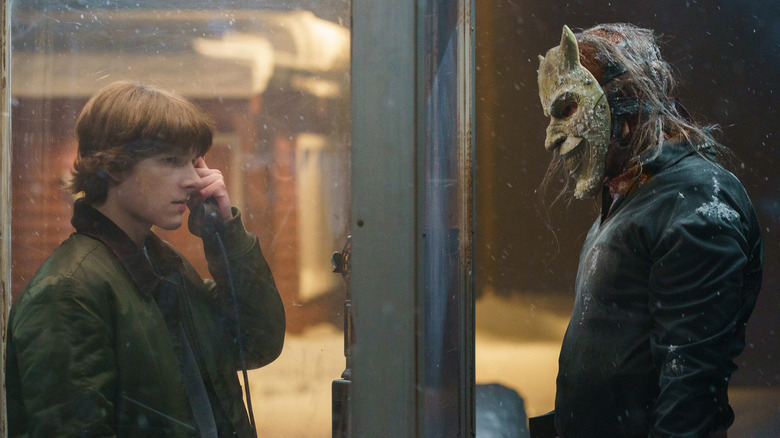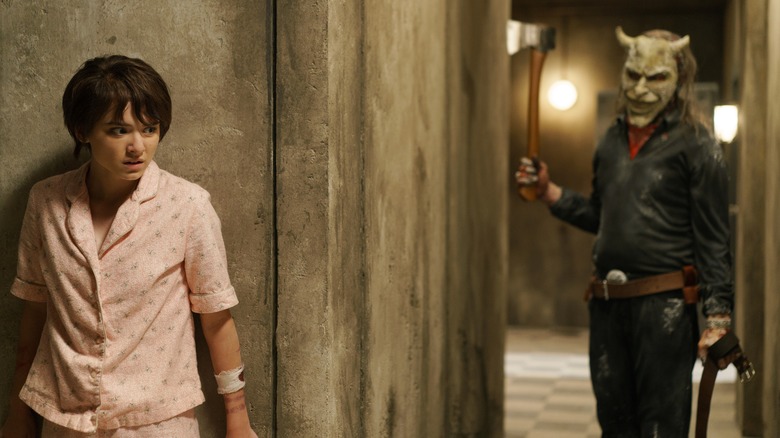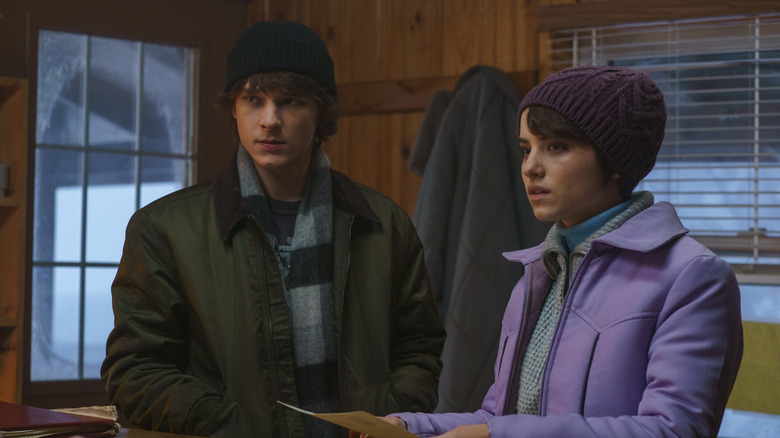Black Phone 2 Review: The Scariest Dreamscape Since Nightmare On Elm Street
- Great performances from Mason Thames and Demián Bichir
- Creative dreamscape set pieces
- Some truly terrible scriptwork when it comes to dialogue, especially in the first act of the film
The terrifying first "Black Phone" movie, based on a short story by Joe Hill, made a rising star out of Mason Thames and established Ethan Hawke as an unlikely but undeniably compelling horror villain, complete with his own iconic mask. Its success made it more or less inevitable that a sequel would be generated, even if there wasn't an obvious angle for a follow-up. "Black Phone 2" largely justifies its own existence, though it's a bit of a mixed bag. It's incredibly well crafted, even as it wears its influences on its sleeve, and it does a solid job of expanding its lore outward while developing its legacy characters (two essential tasks of any burgeoning horror franchise). But it also has some of the most hackneyed dialogue we've ever heard, causing "Black Phone 2" to vacillate between genuine highs when the visuals take precedence and some truly embarrassing lows.
"Black Phone 2" takes place four years after the events of the first film. Finney (Thames) is now a perpetually angry 17 year old haunted by the trauma of his experiences with the Grabber (Hawke). Now, the focus is on his younger sister Gwen (Madeleine McGraw), who has begun to experience psychic dreams for the first time since her brother's kidnapping. She sees boys in a frozen pool, using their fingernails to carve out letters, and then begins sleepwalking through her home. After receiving a mystical dream phone call from her dead mother, she becomes convinced that she needs to go to a Christian camp up in the mountains to investigate the decades-old disappearance of the very boys she's been seeing in her dreams. And Finney, reluctantly, is along for the ride. But as they soon discover, the dead are not resting peacefully, and old foes threaten to ensnare both Finney and Gwen.
Imitation is the highest form of flattery
It's no secret where "Black Phone 2" director Scott Derrickson draws his inspiration. The horror film leans heavily into motifs and visual language established by movies like "The Shining" and especially the "Nightmare on Elm Street" franchise, with its lore surrounding dreams and their mystical interlopers from beyond the grave. But just because its influences are fairly obvious doesn't mean that it feels derivative. In fact, the film's greatest strengths lie in its visual palette and in-dream set pieces, which are shot with a crackly, lo-fi style that lends an eerie aesthetic to Gwen's nightmares. Although they start to feel a little bit repetitive during the first act of the film before things really get going, audiences are rewarded with some creative, thrilling visual choices made as "Black Phone 2" reaches its climax. Unlike many horror movies that start with a great concept and then run out of steam, "Black Phone 2" gets better and better as it goes on. There's a huge quality jump once they get into the ice-cold chill of the mountain camp, and Demián Bichir wrings emotion out of every scene he appears in as the camp caretaker Armando.
The film also deserves credit for how it handles Finney's character development in the aftermath of his run-in with the Grabber. It makes sense that being locked in the basement and relying on other dead kids to help you survive a prolonged encounter with a serial killer would leave its mark. And although in some ways, he's the same kid he was in the first film, he's also filled to the brim with fear and simmering rage. He's tortured by his trauma, and let's be real: this is the early 1980s, and he doesn't exactly have a healthy therapeutic outlet for what he's feeling. Mason Thames again puts in an excellent performance, digging deep into the emotional core of the character. When he hears an out-of-order phone ringing and answers it by simply saying, "I'm sorry, I can't help you," it speaks volumes.
Cringy dialogue left, right, and center
Unfortunately, a lot of the dialogue in "Black Phone 2" is ... well, pretty terrible, actually. In the moments where they're letting the tension breathe, things are fine, but then there are times — especially in the first act — when all of the characters are spouting the most inane, poorly written dialogue that it almost brings the entire film to a standstill. Part of the problem is that the majority of these awful lines fall into the hands of Madeleine McGraw who, don't get us wrong, is excellent in the scenes where she gets to be a proper horror heroine, but can't seem to deliver quirky '80s one-liners with any amount of conviction. It's not really her fault — we don't know anyone who could pull off some of the things she's asked to say, especially when they start peppering in '80s slang with all the subtlety of a nuclear torpedo.
Despite this, when "Black Phone 2" hits, it hits – and that's the case pretty much as soon as they make it up into the mountains. With clever set pieces that utilize Ethan Hawke to his best advantage as an even more disturbing Freddy Krueger, "Black Phone 2" ups the creepiness factor. Which is no small task, especially since the threat facing our heroes is a lot less tangible than a preteen locked in a basement by a serial killer, and in less capable hands could run the risk of lacking urgency. Despite its flaws, "Black Phone 2" is a more than worthy follow-up to its illustrious predecessor.
"Black Phone 2" is now playing in theaters.


